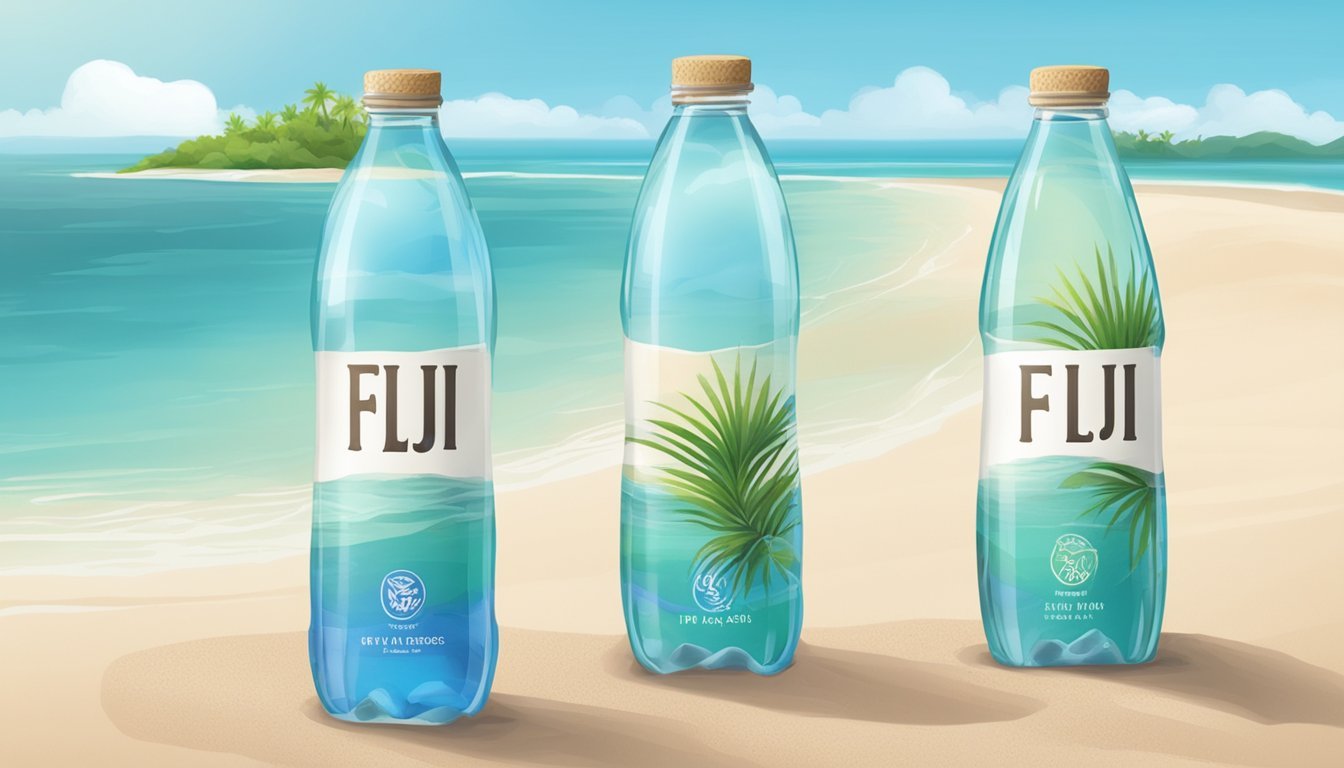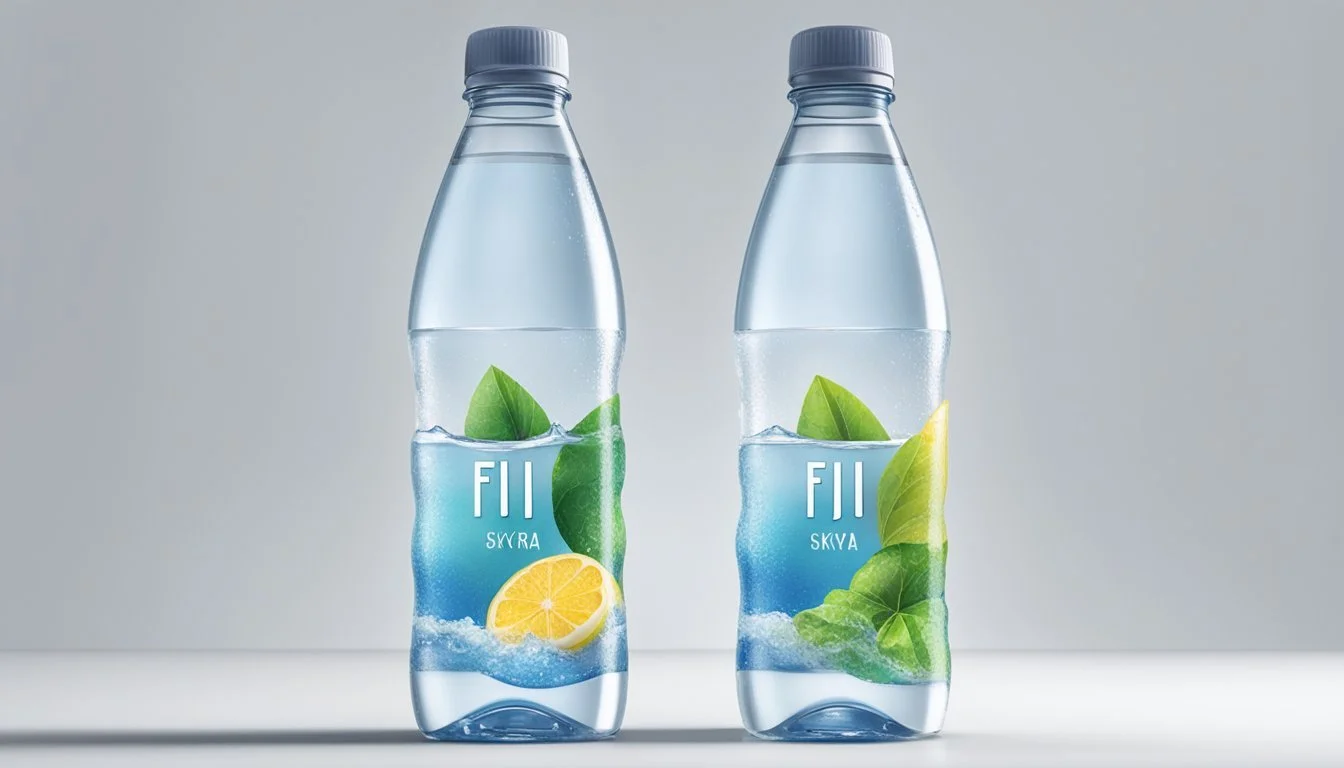Fiji vs. Skyra
Which Bottled Water is Better for You?
In the crowded market of bottled water, Fiji and Skyra stand out for their unique characteristics and promises of purity. Both brands boast naturally sourced water with claims of superior taste and hydration benefits. They are often preferred by consumers who prioritize quality and the source of their water.
Fiji Water is sourced from an artesian aquifer in the remote Fiji Islands, known for its soft and smooth taste. It is marketed as having a naturally occurring, balanced pH level and essential minerals. On the other hand, Skyra Icelandic Spring Water comes from Iceland’s untouched Ölfus Spring and is praised for its very high alkaline pH level, which is believed to offer various health advantages.
Fiji offers a smoother taste, while Skyra appeals to those seeking high alkaline water for its health benefits. Understanding these differences can help you decide which bottled water aligns with your preferences and needs.
The Essentials of Bottled Water
Bottled water provides a convenient source of clean drinking water. Consumers often prioritize certain characteristics when choosing a brand, including hydration, minerals, and electrolytes.
Hydration is the primary purpose of bottled water. Drinking water helps maintain bodily functions, regulate temperature, and support overall health.
Minerals in bottled water can vary. Common minerals found include calcium, magnesium, and potassium. These contribute to the water's taste and potential health benefits.
Electrolytes are important for maintaining fluid balance and muscle function. Bottled waters like Skyra and Fiji may contain different types and amounts of electrolytes.
pH Level
The pH level of bottled water can indicate its acidity or alkalinity. While most bottled waters range from neutral to slightly alkaline, preferences for pH levels can impact consumer choice.
Quick Comparison Table
Feature Fiji Skyra Minerals Yes Yes Electrolytes Yes Yes pH Level ~7.7 (slightly alkaline) Varies (check label)
Consumers appreciate bottled waters that are reliably safe and clean. Brands ensure this through various purification processes, whether it is natural filtration or advanced ionization techniques.
Demystifying Water Sources
Different bottled waters originate from varied sources, each contributing unique characteristics. Understanding these sources can help consumers make informed choices.
Understanding Spring Water
Spring water comes directly from natural springs. Springs form when groundwater channels to the surface, creating a natural flow. This type of water often contains minerals like calcium and magnesium, which are imbibed from the surrounding rocks and soil. Regulations generally require spring water to be collected at the source. It is often popular for its taste and perceived purity, as it typically undergoes minimal processing to retain its natural composition, making it a favorite for those seeking a natural hydration option.
Role of Reverse Osmosis in Purified Water
Reverse osmosis (RO) is a filtration process used to purify water. By forcing water through a semipermeable membrane, RO removes contaminants and impurities such as metals, chemicals, and bacteria. This method is particularly effective in ensuring high purity levels, often resulting in water with a very clean taste. Used in many bottled water brands, RO water is appealing to those who prioritize purity over natural mineral content. Reverse osmosis water is typically enhanced with added electrolytes to improve taste since the process removes both good and bad elements from the water.
Volcanic Rock Filtration in Fiji Water
Fiji Water is sourced from a natural aquifer in Viti Levu, Fiji. The water undergoes a natural filtration process through volcanic rock, which enriches it with minerals like silica, magnesium, and calcium. This distinctive process contributes to its smooth taste and slightly alkaline pH. Volcanic rock filtration is unique because it uses nature’s own filters to purify water, adding distinct mineral properties. This method is particularly significant as it enhances the water's natural characteristics without the need for additional treatments or enhancements.
Artesian Aquifers of Icelandic Water
Icelandic water brands like Skyra often source their water from artesian aquifers. An artesian aquifer is a confined groundwater resource that naturally rises to the surface due to pressure. Icelandic aquifers benefit from being surrounded by pristine environments, resulting in high-quality, naturally pure water. The volcanic origin of Iceland further enriches the water with minerals while naturally filtering it. This process ensures that the water is typically very pure, reflecting the clean, unpolluted nature of Iceland’s environment.
Health Benefits and Hydration
Fiji and Skyra bottled waters offer unique health benefits. They contain essential minerals and electrolytes that can boost hydration efficiency. Additionally, their pH levels and alkalinity play a vital role in maintaining body health.
Electrolytes for Enhanced Hydration
Both Fiji and Skyra waters contain naturally occurring electrolytes. These electrolytes, including potassium, calcium, and magnesium, help regulate bodily fluids and maintain balance.
Fiji water naturally contains potassium and silica. Skyra water is sourced from Iceland and is rich in magnesium and calcium. This composition makes both brands effective in replenishing lost electrolytes, ensuring better hydration and muscle function.
Mineral Content and Health
Minerals in water contribute to overall health by supporting various bodily functions. Fiji water is known for its high silica content, which can improve skin elasticity and joint health. It also contains calcium and magnesium in moderate amounts.
Skyra water stands out due to its robust mineral profile, particularly high levels of magnesium and calcium. These minerals are crucial for bone health and metabolic processes. The natural filtration process through volcanic rocks in Iceland enriches Skyra water with these essential nutrients.
Alkalinity and pH Levels
The pH level of water affects its alkalinity, influencing its health benefits. Fiji water has a pH level around 7.7, making it slightly alkaline. This alkalinity helps to neutralize acids in the body, supporting systemic health.
Skyra water also boasts a naturally high pH, typically ranging between 8 and 9. This higher alkalinity can aid in balancing the body's pH levels, potentially reducing acidity and supporting overall well-being. Consumers looking for alkaline water may find Skyra an attractive option for its potent alkalinity benefits.
Taste Profile Comparison
Comparing the taste profiles of Fiji and Skyra, the differences lie chiefly in mineral content and resulting flavors. The crux of their distinction revolves around how water source influences taste.
Water Taste Dynamics
Fiji Water is often praised for its smooth and soft mouthfeel, attributed to its silica content. This mineral gives Fiji water a distinct softness that many drinkers find pleasant.
Skyra Water, sourced from Iceland, boasts a crisper and more refreshing taste. This can be connected to its natural filtration through volcanic rocks, which adds a unique blend of minerals without an overpowering taste.
These distinct qualities set Fiji and Skyra apart for different palates.
Identifying the Crispness in Water
Crispness in water often connects to the minerality and filtration process. Skyra Water exemplifies this with its volcanic filtration, creating a clean and crisp sensation.
Fiji Water, while smooth, also offers a form of crispness, but it's more subtle than Skyra. The bicarbonates in Fiji water provide a rounded, soft finish, contrasting with Skyra’s sharper edge.
Each brand's unique sources and mineral profiles contribute to these differentiating characteristics, appealing to different taste preferences.
Safety and Purity Standards
Bottled water safety and purity are regulated by multiple entities, and understanding these standards is crucial when choosing between Fiji and Skyra. Key considerations include regulatory guidelines, contamination risks, and the effectiveness of filtration processes.
EPA and FDA Regulations
Both the Environmental Protection Agency (EPA) and the Food and Drug Administration (FDA) play significant roles in regulating bottled water. The EPA sets standards for tap water, ensuring safety from contaminants. For bottled water, the FDA adopts these EPA standards and implements additional regulations under the Federal Food, Drug, and Cosmetic Act.
Monitoring and regular testing are required to ensure compliance. Bottled water companies must adhere to strict labeling, manufacturing, and quality control processes. Fiji and Skyra must meet these stringent guidelines, ensuring their water is safe for consumption.
Contaminants and Heavy Metals
Contaminants such as bacteria, pesticides, and heavy metals are primary concerns in bottled water. The presence of these substances can pose health risks. Heavy metals like arsenic, lead, and mercury must be kept below federally mandated limits.
Fiji and Skyra undergo rigorous testing to detect and eliminate harmful contaminants. Fiji is known for its low levels of heavy metals, partly due to its unique source in the artesian aquifers of Viti Levu. Skyra, on the other hand, emphasizes its natural Icelandic filtration processes to maintain purity.
The Significance of Filtration and Microfiltration
Effective filtration is critical in ensuring water purity. Filtration processes like microfiltration remove particles, bacteria, and other contaminants at a microscopic level. This process enhances the safety and taste of the water.
Fiji's water is naturally filtered through volcanic rock, which contributes to its mineral profile and purity. Skyra also utilizes a thorough filtration system, including advanced microfiltration techniques, to ensure their water remains free from impurities. Both brands emphasize their commitment to delivering water that meets strict purity standards.
These guidelines and processes assure consumers that Fiji and Skyra maintain high levels of safety and purity.
Environment and Sustainability
Fiji Water and Skyra Water both present unique approaches to environmental sustainability, including their packaging solutions, carbon footprint, and recycling efforts.
Eco-Friendly Packaging Solutions
Skyra Water emphasizes the use of glass bottles to minimize environmental impact. Glass is fully recyclable and often reused, reducing the need for new materials. Fiji Water, on the other hand, uses plastic bottles, which contribute to global plastic pollution despite some being recyclable.
While plastic is lightweight and easily transportable, it is less environmentally friendly than glass or paper alternatives. Skyra's glass bottles represent a significant step toward sustainability, potentially appealing to environmentally conscious consumers.
Water Brands' Carbon Footprint
Skyra Water sources its water from Iceland, claiming a carbon-neutral production process. This includes using renewable energy sources and efficient logistics to reduce emissions. Conversely, Fiji Water sources water from Fiji and ships it worldwide, resulting in a higher carbon footprint primarily due to long-distance transportation.
Skyra's claims of carbon neutrality are backed by partnerships with third-party organizations that certify these efforts. Fiji Water has faced criticism for its carbon emissions but has initiated programs to offset its carbon footprint by investing in renewable energy projects and improved production processes.
Recycling and Waste Reduction Efforts
Skyra Water encourages consumers to recycle their glass bottles, providing information and incentives for proper disposal. Glass, being infinitely recyclable, contrasts with the limited recyclability of plastic.
Fiji, while using predominantly plastic bottles, has introduced some initiatives to enhance recycling rates. They collaborate with municipal recycling programs and have invested in recycling education. These efforts aim to reduce the environmental impact but still face challenges due to the inherent nature of plastic waste.
Both brands aspire to mitigate their environmental impact, but Skyra's use of glass and claims of carbon neutrality might offer a more eco-friendly image compared to Fiji’s reliance on plastic and longer shipping distances.
Market Presence and Consumer Choices
Fiji and Skyra are prominent bottled water brands that have garnered consumer attention through strategic endorsements, brand positioning, and wide availability. This section examines these aspects to understand their impact on consumer preferences.
Celebrity Endorsements and Brand Image
Celebrity endorsements play a significant role in shaping brand image. Fiji Water has seen endorsements from high-profile figures like RuPaul and Blake Lively, enhancing its luxury appeal.
Skyra Natural Icelandic Water might not have the same star-studded endorsements, but it focuses heavily on its natural purity and origin, which appeals to environmentally conscious consumers. These differing approaches reflect their market positioning—Fiji as a status symbol and Skyra as a natural, premium option.
Comparing Popular Water Brands
In comparison to other popular brands, Fiji and Skyra occupy unique niches.
Fiji Water is often rated highly for its taste and is one of the pricier bottled waters, catering to premium buyers. It's priced around $2.50 for a 500ml bottle. On the other hand, Skyra emphasizes its purity derived from Icelandic springs and is slightly less expensive, appealing to a different segment.
Both brands compete with others like Smartwater and Evian in the premium bottled water market. While Fiji is widely recognized in surveys and studies for its favorability, Skyra’s key selling point lies in its pure, uncontaminated origins.
Convenience and Accessibility
The availability of these water brands is crucial for their market presence. Fiji Water is broadly accessible, found in many supermarkets, convenience stores, and high-end establishments, making it a convenient option for consumers.
Skyra Water, while perhaps not as ubiquitous as Fiji, is increasingly available in health-focused stores and online platforms. This selective availability underscores its positioning as a specialized, niche product, favored by those seeking premium, natural bottled water.
Retail Availability Comparison:
Brand Availability Fiji Supermarkets, convenience stores, high-end venues Skyra Health stores, online platforms
Through these strategies, both Fiji and Skyra have established significant yet distinct market presences, appealing to a wide range of consumers based on their preferences and values.
More About Fiji
Fiji vs Mountain Valley Spring Water: Which Bottled Water is Better?
Fiji vs Whole Foods Italian Still Mineral water: Which Bottled Water is Better?






